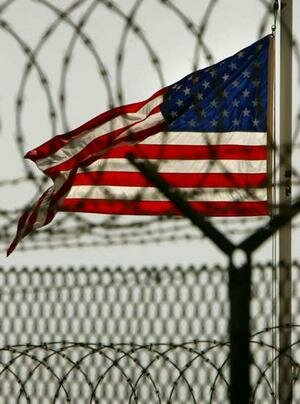|
November 01, 2006 Article from: The Associated Press
LAWYERS for dozens of Guantanamo Bay detainees have asked a US appeals court to declare a key part of George Bush's new military tribunal law unconstitutional.
In written arguments filed with the US Court of Appeals for the District of Columbia Circuit, the lawyers (including ones for David Hicks) challenged the military's authority to arrest people overseas and detain them indefinitely without allowing them access to US courts to contest their detention.
Mr Bush gave the military that authority earlier this month when he signed a new law that sets up military commissions to hold trials for foreigners designated as "enemy combatants."
Mr Bush hailed the law as a crucial tool in the war on terrorism and said it would allow prosecution of several high-level terror suspects.
Lawyers for more than 100 detainees who will be locked out of the court system under the new law asked the appeals court to let them keep their legal challenge going in civilian courts.
They said the framers of the US Constitution never would have permitted the government to hold people indefinitely without charging them.
"Persons imprisoned without charge must retain the right to obtain a court inquiry into the factual and legal bases for their imprisonment," lawyers wrote.
This argument echoes a Supreme Court ruling in June, when justices declared that the Bush administration's system of trying enemy combatants violated US and international law.
Within weeks, the president convinced Congress to pass a new law setting up military commissions and barring detainees from using the civilian court system.
Shortly after the new military commissions law was signed, the Justice Department told hundreds of detainees that their cases in the US courts had been rendered moot.
Seven retired federal judges from both the Republican and Democratic parties filed the legal briefs in the detainees case before the Washington appeals court, arguing that the military commissions law would allow authorities to use evidence obtained by torture.
Although the law prohibits torture, the judges said the military has not addressed torture claims made by detainees. The judges also argued that the new law illegally strips courts of the power to question military decisions about the detainees' torture claims.
The Justice Department has until November 13 to respond to the detainees claims.
Adelaide-born Hicks has been held in Guantanamo Bay since soon after he was captured with Taliban forces in Afghanistan in late 2001.
US authorities charged him with conspiracy to commit war crimes and attempted murder by an unprivileged belligerent and aiding the enemy, but the charges were dropped after the Supreme Court ruling.
- David Hicks Case Information
|


 The Department of Foreign Affairs says it is not aware of allegations that Guantanamo Bay detainee David Hicks has refused to meet consular officials because he believes he has been punished after previous visits.
The Department of Foreign Affairs says it is not aware of allegations that Guantanamo Bay detainee David Hicks has refused to meet consular officials because he believes he has been punished after previous visits.
 Amnesty International has accused the Australian government of abandoning terror suspect David Hicks and doing nothing to ensure sure he gets a fair trial.
Amnesty International has accused the Australian government of abandoning terror suspect David Hicks and doing nothing to ensure sure he gets a fair trial.



